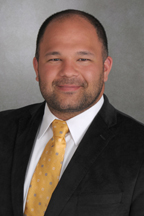
Assistant Professor of Psychiatry, Adam Gonzalez, PhD received two new awards to augment his work with responders to the 9/11 World Trade Center (WTC) disaster and the victims of Hurricane Sandy. The awards, totaling $721,832, were made by the Health and Human Services Assistant Secretary for Preparedness and Response.
Dr. Gonzalez is currently the principal investigator on a grant to evaluate the efficacy of a novel mind-body treatment for WTC responders with comorbid PTSD and respiratory illness and on a grant to study the effects of Hurricane Sandy on the respiratory and mental health of WTC responders. He is the co-investigator on a grant to evaluate an enhanced smoking cessation intervention for WTC responders. All three studies are being conducted under the auspices of the WTC Health Program’s Long Island Clinical Center of Excellence, headed by Benjamin Luft, MD.
One of the new grants, titled "Longitudinal Study of Mental Health and Post-Traumatic Growth in Responders and Community Members Affected by Hurricane Sandy," will be conducted in collaboration with the Feinstein Institute for Medical Research at the North Shore-LIJ Health System. Dr. Gonzalez and his colleagues are seeking to understand more about the factors that promote resiliency and psychological growth among people who experience the trauma of major disasters. As part of the project they plan to videotape responders’ accounts of how their experiences with the WTC and Sandy impacted their lives in a positive way, supplementing the documentary materials compiled by the Remembering 9/11 oral history project.
The second grant will enable Dr. Gonzalez and his co-investigator Brittain Mahaffey, PhD to study the efficacy of a brief resilience training program for responders to Hurricane Sandy. This will be the first randomized clinical trial to evaluate the resilience training program. The researchers plan to tailor the program, originally developed for responders to the 2010 Gulf of Mexico oil spill, to the unique characteristics of responders to Hurricane Sandy, and to test its ability to enhance resilience and promote psychological health.
Both grants will provide funding for two years.